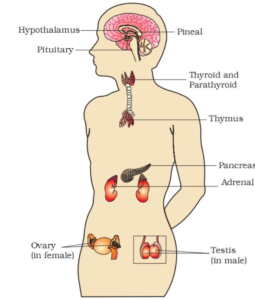Chemical Coordination and Integration MCQ/objective questions Chapter 22 Biology
Endocrine glands are ductless glands that secrete their hormones into:
- a. Blood

- b. Lymph
- c. Stomach
- d. Kidneys
Nervous system mediate with enedocrine glands using hormones from
- a. Thalamus
- b. Pituitary
- c. Gonads
- d. Thyroid
Which hormones thalamus secrete?
- a. Gonadotropin releasing hormone (GnRH)
- b. Somatostatin
- c. Both
- d. None
Which among these is not secreted by adenohypophysis?
- a. Growth hormone (GH)
- b. Thyroid stimulating hormone (TSH)
- c. Melanocyte stimulating hormone (MSH)
- d. Prolactin (PRL)
Which hormone is called Anti-diuretic hormone
- a. Oxytocin
- b. Vasopressin
- c. ACTH
- d. FSH
Which hormone among these do not show anabolism?
- a. Growth horone.
- b. Thyroid
- c. Glucocorticoids
- d. FSH
The hormone that reduce the growth of the body is:
- a. Thyroid
- b. Growth hormone
- c. Testosterone
- d. Somatostatin
The hormone that promote testosterone synthesis in males is:
- a. LH
- b. FSH
- c. Oxytocin
- d. Vassopressin
The hormone that promote spermatogenesis in males is:
- a. LH
- b. FSH
- c. ACTH
- d. GH
The hormone that induces ovulation in females is:
- a. Estrogen
- b. LH
- c. FSH
- d. None
Which hormone control the sodium and potassium balance in our body?
- a. Oxytocin
- b. Vassopressin
- c. Thyroid
- d. Parathyroid
Which mineral is essential for thyroxine production:
- a. Iron
- b. Manganese
- c. Iodine
- d. Sodium
Which among these is the most potent thyroid hormone.
- a. Di-iodo thyronine (T2)
- b. Tri-iodo thyronine (T3)
- c. Tetra-iodo thyronine (T4)
- d. None
Excessive secretion of thyroid hormone leads to:
- a. Goitre
- b. Acromegaly
- c. Grave’s disease
- d. Dwarf
Which hormone control sleep-wake cycle?
- a. TSH
- b. Melatonin
- c. GH
- d. FSH
Which hormone increases the blood calcium level?
- a. Thyroid
- b. Parathyroid
- c. Thyrocalcitonin
- d. GH
The hormone that promote strong bones is:
- a. TSH
- b. Thyroid
- c. Thyrocalcitonin
- d. Parathormone
Which endocrine gland degenerates in old age?
- a. Pituitary
- b. Thyroid
- c. Pineal
- d. Thymus
Which gland secrete emergency hormone?
- a. Thyroid
- b. Anterior lobe of pituitary
- c. Thalamus
- d. Adrenal medulla
The gland responsible for mineral and glucose balance is:
- a. Thyroid
- b. Pituitary
- c. Thymus
- d. Adrenal cortex
Testosterone is secreted by:
- a. Interstial cells of Leydig
- b. Seminiferous tubule
- c. Graffian follicle
- d. Corpus luteum
Which part of the ovary secrete progesterone?
- a. Corpus luteum
- b. Graffian follicle
- c. Ovarian follicle
- d. None
Heart releases Anti natriuretic factor (ANF) in response to:
- a. Increased blood pressure
- b. Decreased blood pressure
- c. Low PO2
- d. High PO2
Which hormone among these is not under any +ve feedback control of pituitary
- a. Growth hormone
- b. FSH
- c. Thyroid
- d. Insulin
See also:
- Breathing and Exchange of Gases MCQ
- Body Fluids and Circulation MCQ
- Excretory Products and Their Elimination MCQ
- Locomotion and Movement MCQ
- Neural Control and Coordination MCQ
Chemical Coordination and Integration MCQ/objective questions Chapter 22 Biology
Ref: Ch 22.